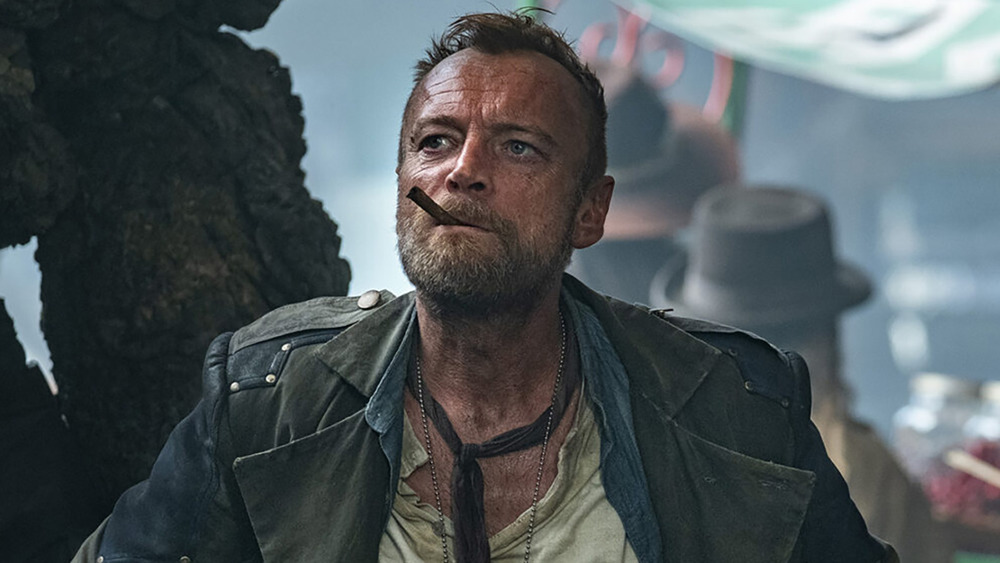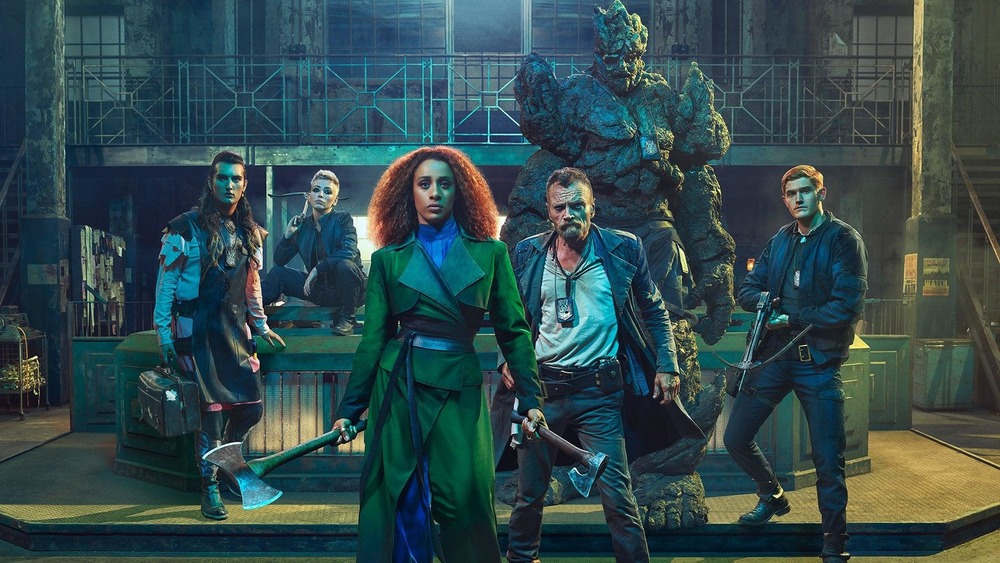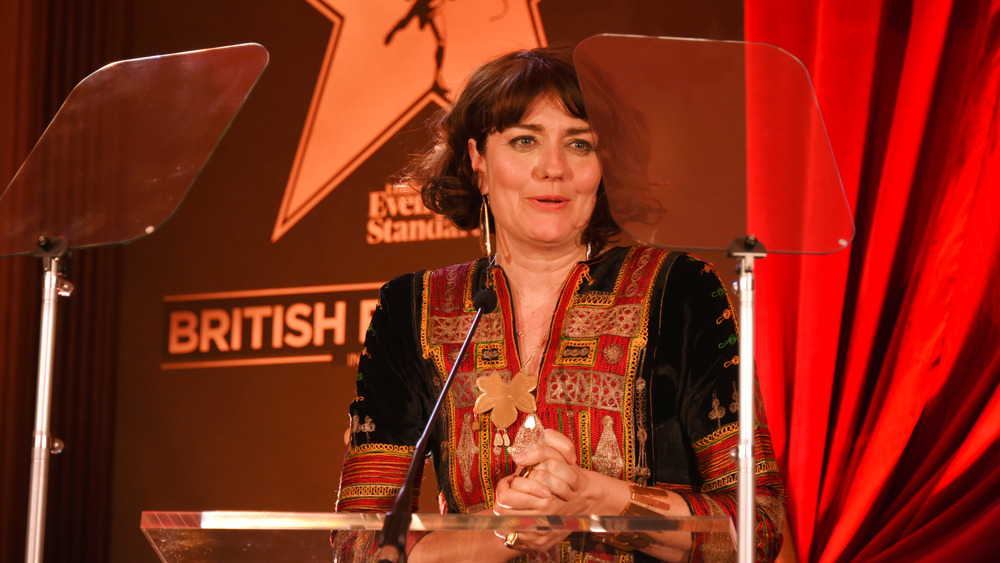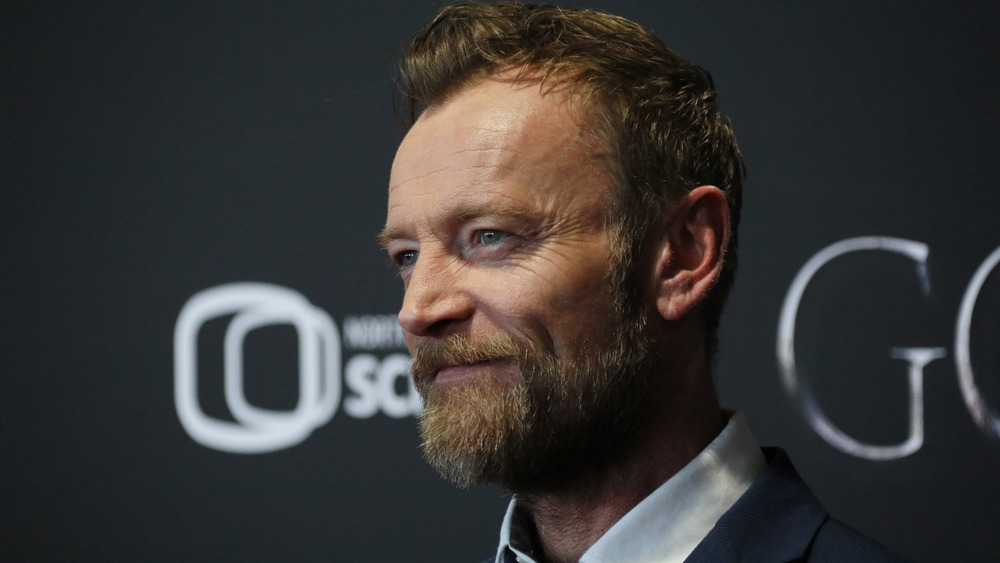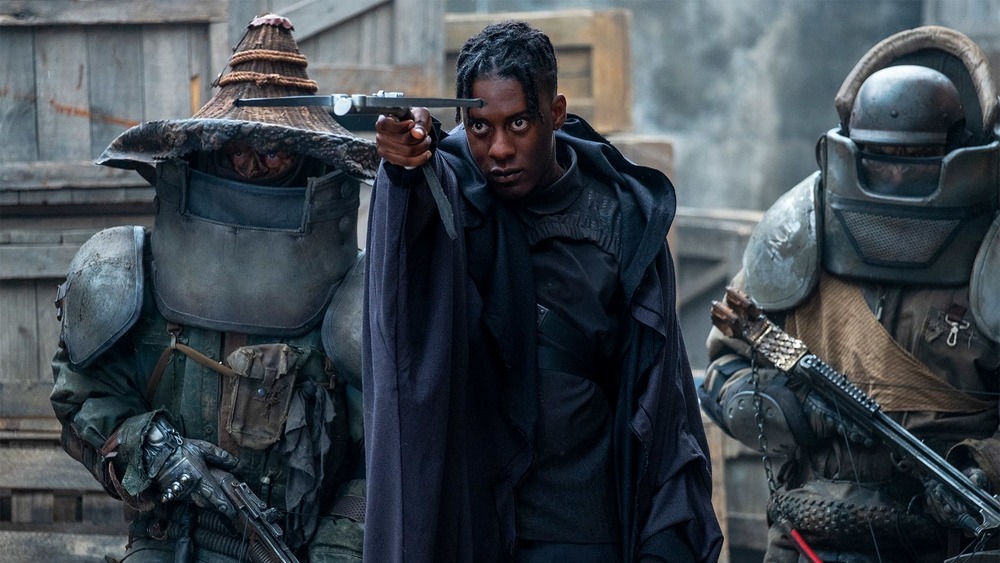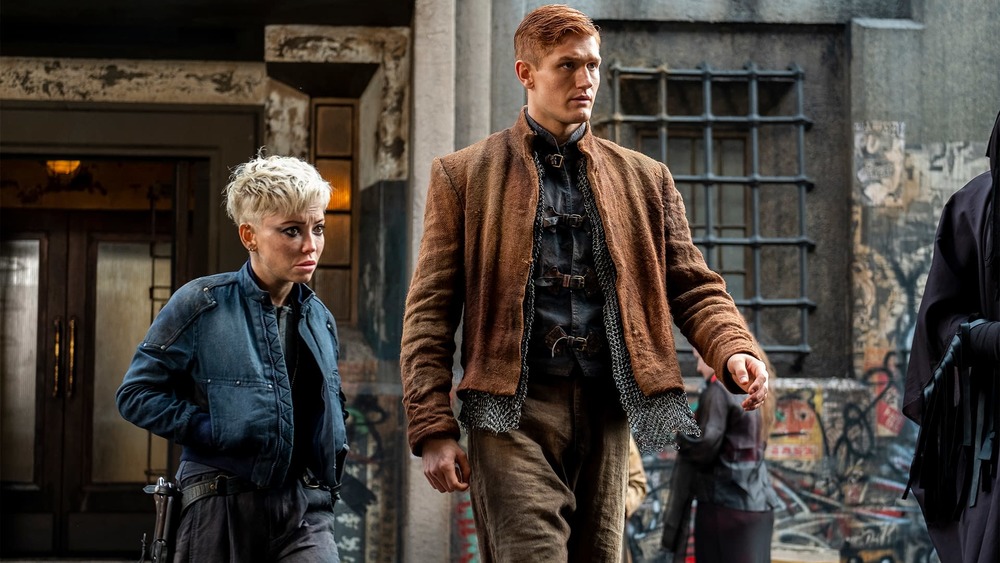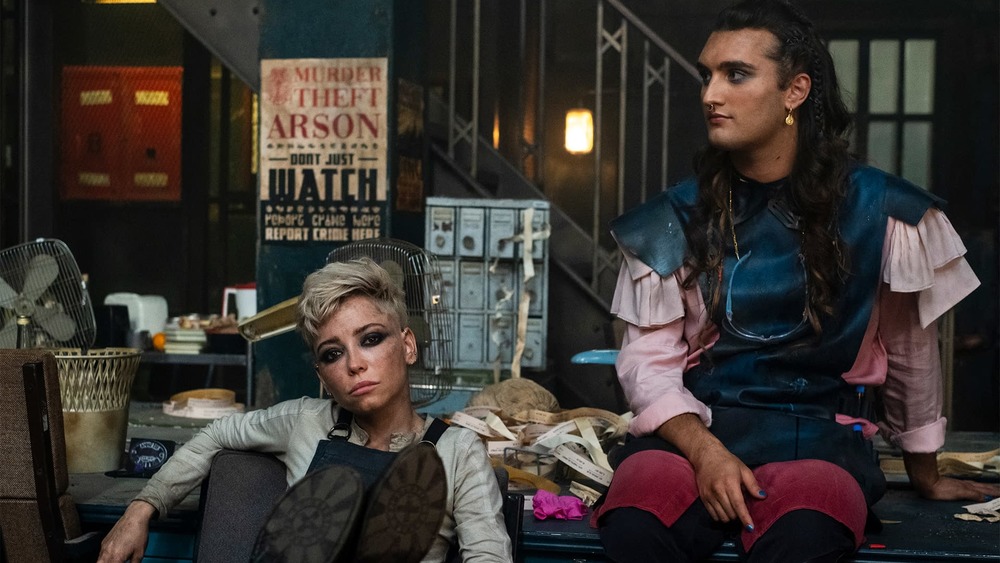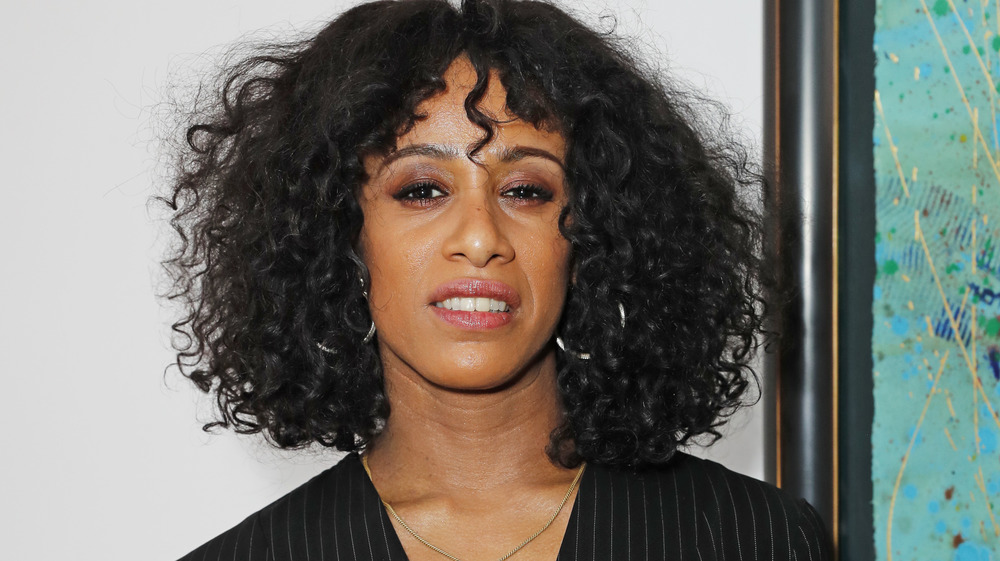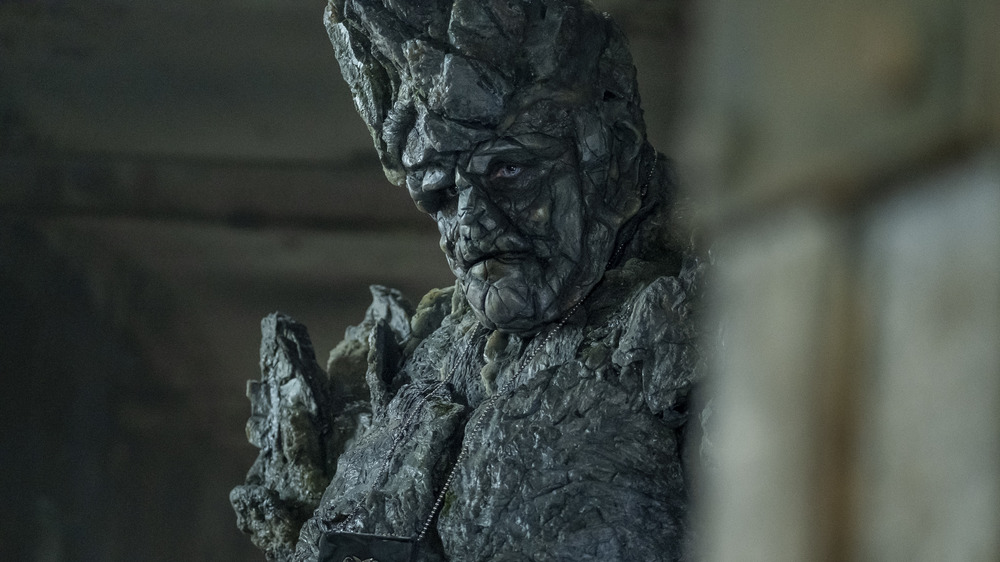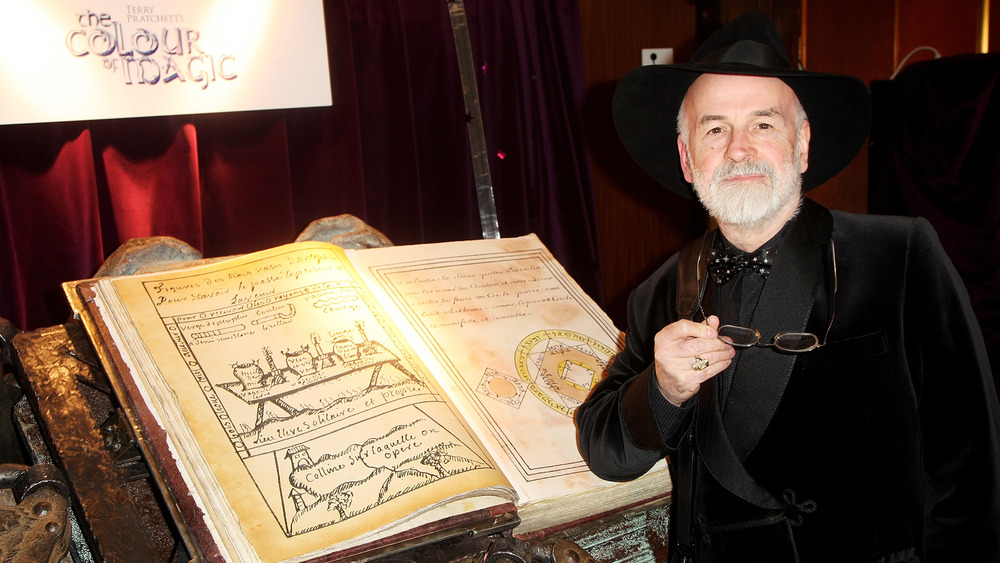The Watch: Your Guide To The Discworld Characters
Terry Pratchett's long-running Discworld series is ripe for adaptation in this IP-hungry television landscape. The expansive high fantasy world envisioned by the late author is overflowing with colorful characters, storylines, and ideas, fleshed out over the years in Sir Pterry's satirical novels.
BBC America landed on a hit when they optioned perhaps the most small-screen ready portion of Pratchett's literary universe: The Night Watch. This group of policemen, who work in Discworld's major city of Ankh-Morpork, has all the elements that make for great television. There's a humming and gritty metropolis, a fantasy world governed by magical rules, and a grizzled police chief named Sam Vimes, who lights his chomped cigars with the help of baby dragons.
As the BBC has made quite a few changes to the source material in the process of turning it into The Watch, it can be helpful for novices (and those who haven't read the books in quite a while) to learn who these characters are. With that in mind, we've put together a primer on The Watch's cast of characters, noting what's been shifted to get the show to the screen.
Discworld, explained
Discworld is exactly that: A flat planet in the shape of a disc. It rests on the back of four elephants who, in turn, stand on the shell of a cosmically large turtle. The travel of Discworld through space is governed by the whims of the great turtle, named the Great A'Tuin. No one can really say what it wants, though the philosophers and priests of Discworld do try.
Discworld operates a bit outside our understanding of physics, existing within a magical field that spreads outward from a 10-mile-high mountain at the disc's center, known colloquially as the Hub. Under the influence of this magic, Discworld has developed every high fantasy race you can dream up: Werewolves, trolls, dwarves, goblins, and humans all call the disc home. These varied groups tend to live in their own regions of the disc, their societies shaped by their unique characteristics and environment. But they all come together in the world's biggest city: Ankh-Morpork.
Life in Ankh-Morpork
Nearly every person and place Terry Pratchett put down in the pages of his Discworld novels is meant to satirize something in our real world. Entire pages are often devoted to setting up one single pun or silly joke. But it's not all one-off riffs — Discworld's satire goes deep. Every setting and character serves as a poke in the eye to some archetype of fiction, or a commonly accepted part of life.
Ankh-Morpork is the biggest city in Discworld. As such, it's a sendup of "The Big City" as a concept. Impossibly grimy, seedy to a fault and proud of it, Ankh-Morpork prides itself on being a place where everyone on Discworld can live in harmony ... as long as you don't look too closely at the murder rate. It's where nearly all of the world's money-making businesses set up shop, and that general scumminess trickles down from the boardrooms to infect every supposedly upright citizen and gutter dweller in the sprawling metropolis. Ankh-Morporkians are proud of their home in no small part because they've survived it this long — a sentiment one can find all over our own world.
Lord Havelock Vetinari
If one person can be said to exemplify Ankh-Morpork, it's Lord Vetinari. The Patrician of Ankh-Morpork perfectly encapsulates all of the disparate parts of life in the city (and not just because, as dictator, his word is law within its limits). Vetinari is a stylish and erudite leader who worked his way up to the position by being a standout killer-for-hire in the Guild of Assassins. As befits someone who made a name for himself in a place where big names tend to have short lives, Vetinari is an endless schemer. His plots and machinations tend to have plots of their own, and he's managed to hold onto his position by being five steps ahead of every plan — including his own.
Vetinari is a firm believer in "one man, one vote," in that he is the one man who has the one vote. He maintains his status as dictator by not making his presence felt in the daily lives of Ankh-Morpork citizens. The motto on his family crest sums this approach up well: It translates to, "if it ain't broke, don't fix it." Vetinari believes that his citizens don't want justice or democracy — they just want things to stay consistently the same. So far, no one has been bold enough to tell him otherwise.
The Watch has gender-flipped the character: Lord Vetinari is played by Anna Chancellor. Though this is a departure, the show appears to have left the core of who Vetinari is intact.
Commander Sam Vimes
The closest most citizens come to feeling the weight of what precious little regulation Ankh-Morpork has is in dealings with the Night Watch. The city's police force spent years as a bit of an inside joke, a make-work program for the unemployable bruisers who grew up in Ankh-Morpork's shiftier neighborhoods. They had precious little to do beyond taking bribes and relaxing in a city where crime regulates itself, via legalized guilds for unsavory work. Carrying out a murder might bring the police in our world, but in Pratchett's, it's much more likely to be handled by troll enforcers who don't take kindly to scabs taking union work from assassins.
This changes with the arrival of Sam Vimes. The eventual commander of the Watch brings modern detective work, formalized schedules, and a bit of respectability to the Watch. That's not to say he's a brown-noser, however: Vimes grew up in the rough neighborhoods he has to patrol. His characterization comes off somewhere between Dirty Harry and Sherlock Holmes. He has an inborn distrust of nobility and the rich, something that comes to chafe him when he marries into high society and begins racking up titles. Early indications are that The Watch's Vimes isn't much changed from the grizzled, reluctant leader of the Discworld books.
Carcer Dun
One of the big changes in Sam Vimes' character comes in his relationship to his nemesis, Carcer Dun. Carcer Dun is a lifelong criminal who Pratchett uses to poke fun at famous fictional Big Bads: He has the bearing of Alex DeLarge and the slippery nature of Moriarty. In the books, he irks Vimes for his unwillingness to see the inside of a cell. Watchmen tend to view his insistence on outrunning them as unsportsmanlike. Vimes' law-and-order, straight-arrow outlook fuels his constant pursuit of Dun. This provides a backdrop for Pratchett to have a little fun riffing off Les Miserables' Javert and Jean Valjean, with Dun noting that his original crime was stealing a loaf of bread.
The Watch changes Vimes and Dun's backstory: Here, Dun and Vimes grew up together in an Ankh-Morpork orphanage. In this way, the show has made the characters even more similar to Les Mis' famous pair, as Valjean and Javert are both from the absolute bottom of French society.
Constable Carrot Ironfoundersson
The Watch's Constable Carrot Ironfoundersson is a direct lift from the stories of Discworld. In the show and the books, he's a strong, capable, and naive man from the sticks who moves to the city with the hope of making his way in the Night Watch. The 6'6" Carrot was raised by dwarves after his parents died when he was an infant. He was brought up to believe he was a very tall dwarf, only coming to Ankh-Morpork after his father revealed that he was adopted. He sent Carrot away, thinking he should know what it is to live among humans. In truth, Carrot is the heir to the deposed monarchy of Ankh-Morpork, though he seems entirely uninterested in being a king.
Trusting to a fault, Carrot is the sort of mark who the unscrupulous citizens of Ankh-Morpork would typically eat alive. Due to his contagious cheeriness, a few last-second interventions by his savvier fellow policemen, and his imposing physique, however, Carrot very rarely gets conned. People just seem to like him.
Constable Cheery Littlebottom
One of the most notable changes made by The Watch is its handling of Constable Cheery Littlebottom. In the books, Cheery is a dwarf who joins the Watch after an attempted career in alchemy goes up in literal flames. Dwarf society in Discworld is largely neutral with regards to gender: All dwarves have long beards and dress in heavy layers of bulky clothing, while their language uses a single neutral pronoun translated as "he." Though there are male and female dwarves, it's considered uncouth, in dwarven society, to discuss the specifics.
Cheery bucks this by preferring feminine forms of address. She begins to tailor her dress toward styles popular with the human women of Ankh-Morpork, including wearing heels and make-up (though she keeps the beard, with an eye toward tradition). Pratchett largely uses the character as an allegory for LGBTQ rights movements, as she travels home to the mines and kicks off a progressive revolution of dwarves outing themselves as female.
Things are different on The Watch. Cheery is no longer a dwarf, but a nonbinary human portrayed by Jo Eaton-Kent, a nonbinary actor. Though this is a major change, it's in keeping with the themes the original character brings to the fore.
Lady Sybil Vimes
Lady Sybil's portrayal on The Watch contains one of the largest shifts from the source material. In the books, Commander Vimes' wife is a calming force. She serves as a counterbalance to Vimes' endless, street-worn cynicism, and dearly wants the best for her bedraggled husband. Sybil is a sheltered member of the upper crust, as the heir to the largest fortune in Ankh-Morpork and a descendant of one of the city's founding families. Still, she's possessed of a toughness that few in her class can claim, owing to her lifelong desire to work with her hands and tend to some of the most dangerous animals on Earth.
In contrast, The Watch turns Lady Sybil into Ankh-Morpork's answer to Bruce Wayne. The rich heiress goes from being an eccentric largely concerned with tending to her prized dragons to being a vigilante who roams the streets, doling out extrajudicial justice.
Rounding out the cast
Filling out the Watch are Delphine Angua Von Uberwald and Detritus. The former, known as Angua, is a werewolf who has taken to police work to rebel against the traditionally violent lives lead by werewolves. She's in a relationship with Carrot, and has made him swear to kill her should she ever lose control of her powers. On the show, Angua and Carrot have yet to become a pair. Their status within the force is also flipped, as Carrot trained Angua in the books, while the opposite is true on The Watch. On a superficial level, the show has also rid Angua of her long hair, which is used by fellow Watch members to identify her, even in wolf form.
Detritus is a troll. In Discworld, this means he's a living rock creature whose silicon brain slows and speeds his thinking, depending on the outside temperature. After working as a "splatter" (like a bouncer, but harder) at Ankh-Morpork's most notorious dive, the absolutely massive Detritus becomes a Watchman when his wife suggests he find a stable career. On The Watch, he's gifted a helmet that cools his head and allows him to think quickly.
The Watch also features one of the most popular characters in all of Discworld: Death. His closeness with the living has developed into an obsession with humanity: He frequently tries to ape their customs as an outsider, getting one or two key details wrong.
Who's missing
The biggest difference between Discworld and The Watch comes in characters who have been entirely omitted from the screen. Corporal Nobby Nobbs and Sergeant Fred Colon have been excised from the force, either in service of a tidier story or due to the need to portray a more competent police force. In the books, Nobbs and Colon are relics of the bad old days of the Watch. They are largely amoral, with minimal interest in stopping crime and an aversion to hard work. Nobbs is a true urchin, someone so filthy that his armor regularly rusts from coming into contact with his skin. As is frequently pointed out in the series, Nobbs is one of many humans on the Watch, but he's the only one who needs a certificate to prove it.
Colon is Nobbs' best friend and partner. Though both are frequently shown to be doing as little police work as possible, they often stumble into leads and help break cases because of their own closeness to the criminal underworld. It remains to be seen if the show will bring aboard these beloved oafs.
